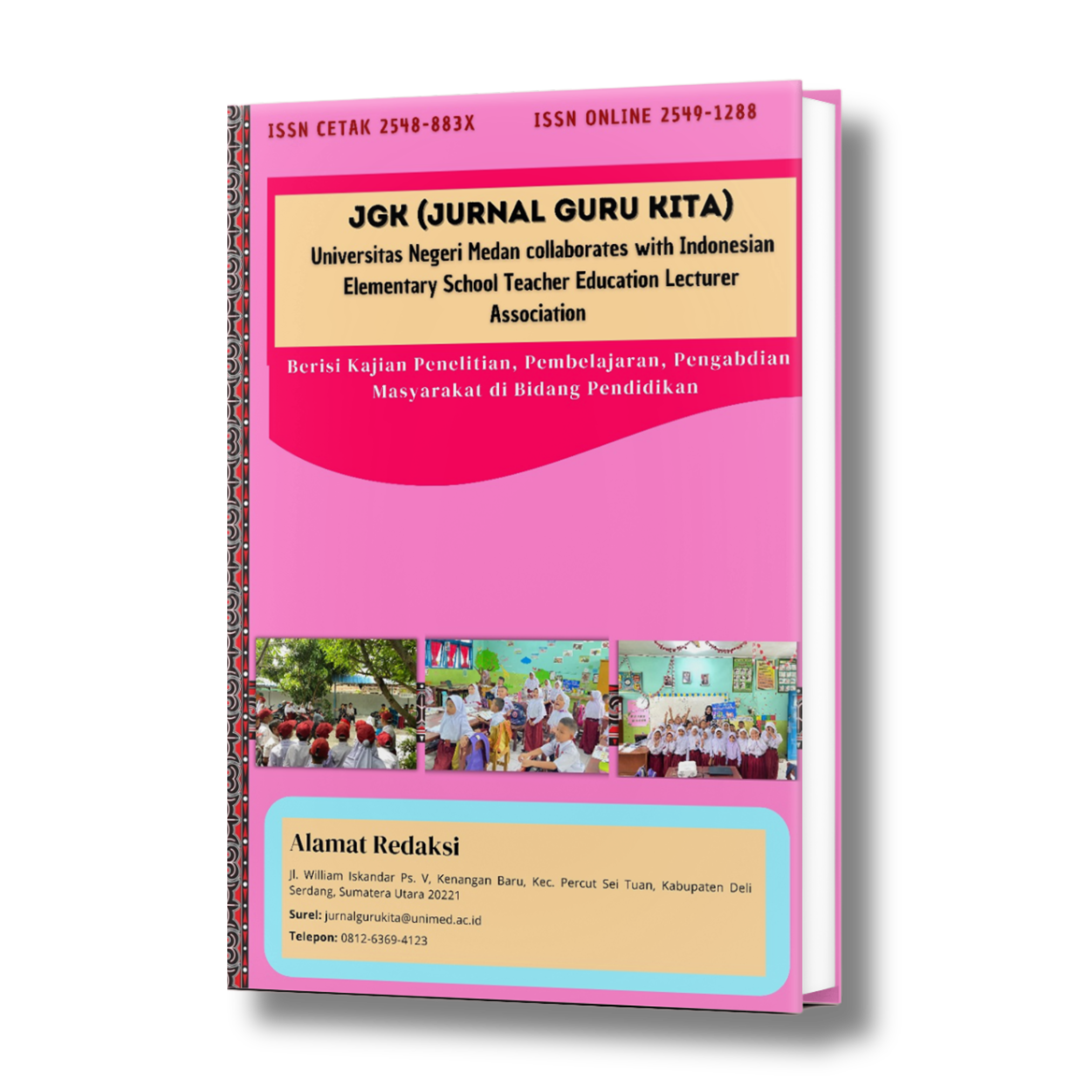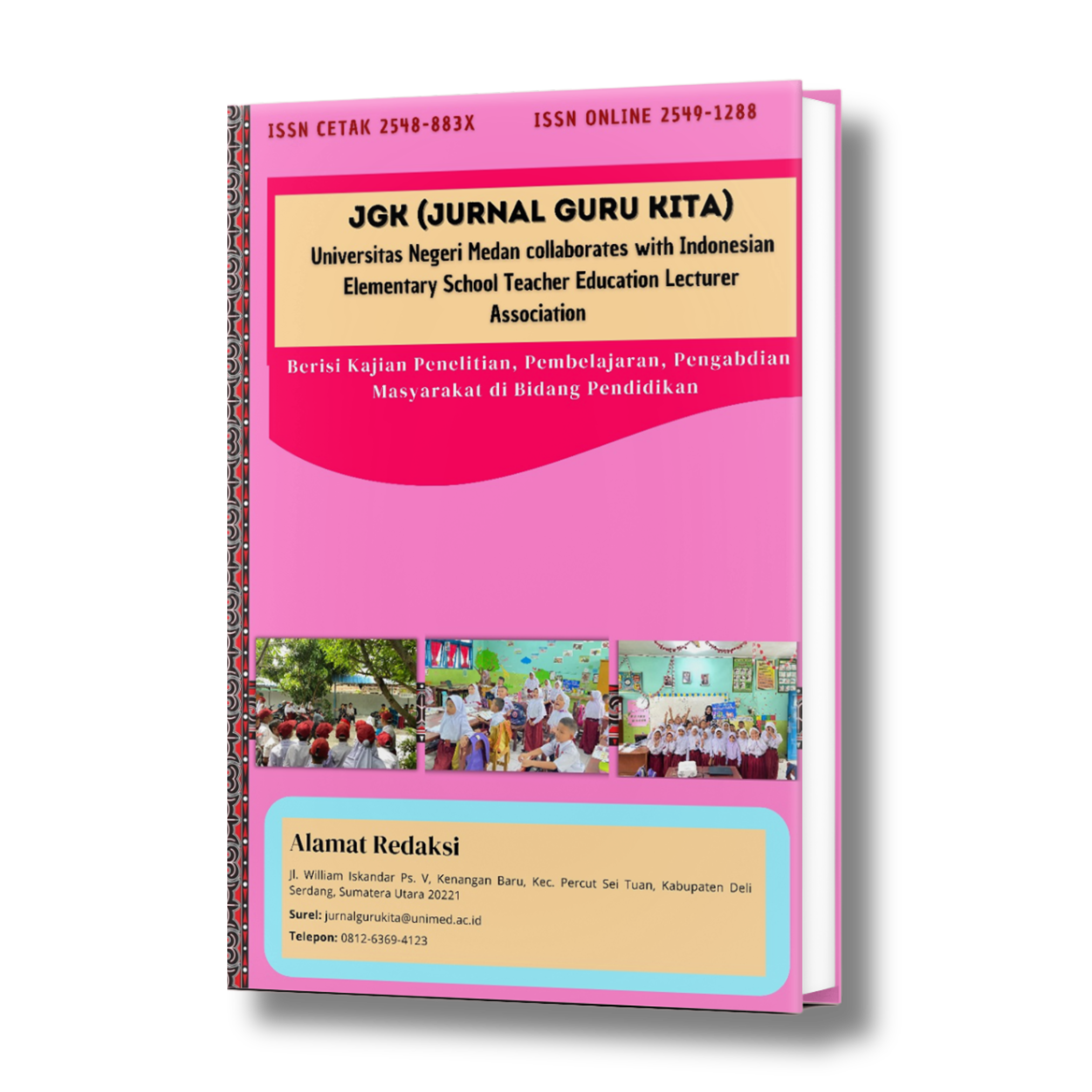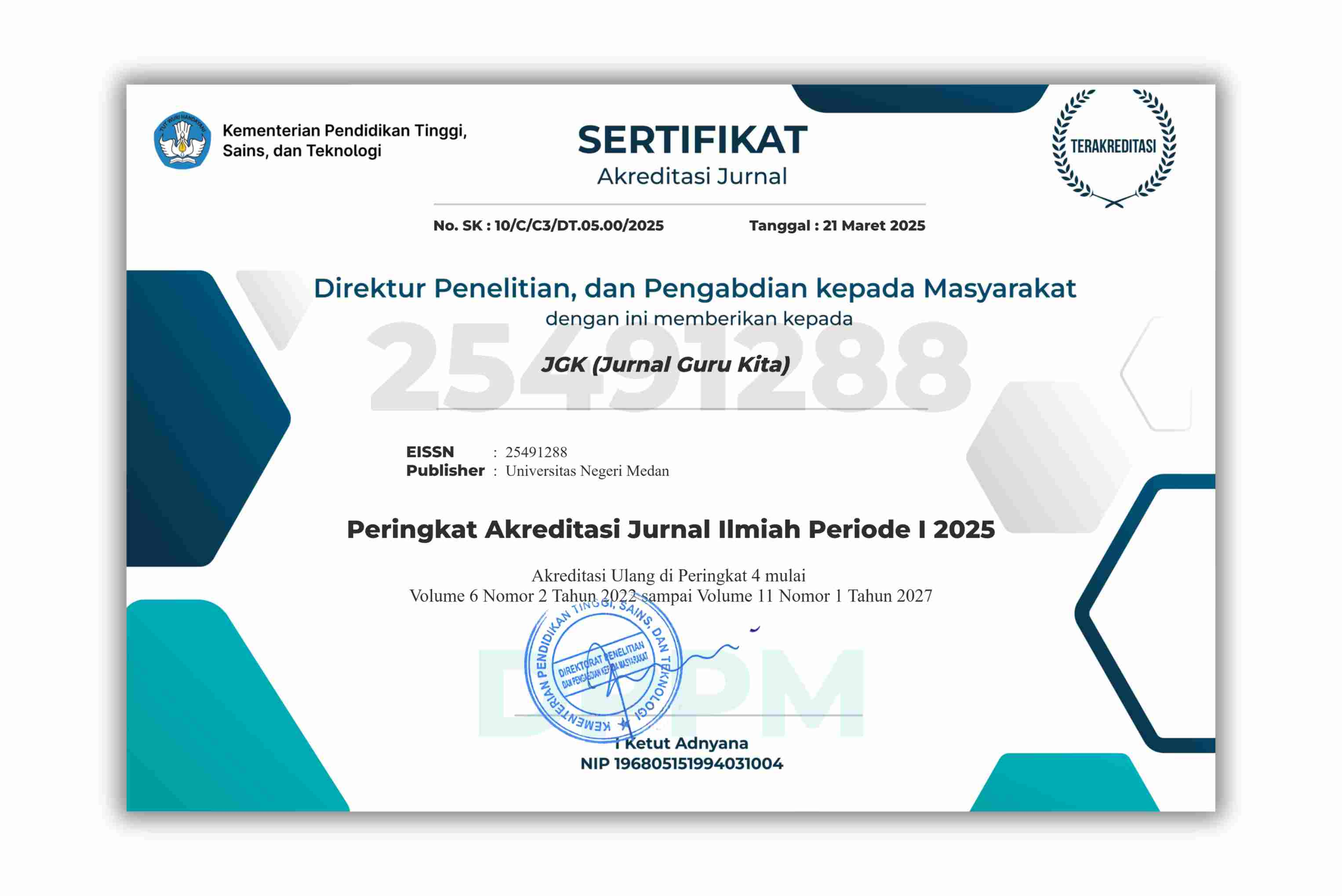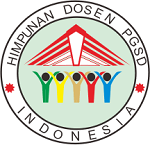Pengembangan Bahan Ajar Konsep Dasar PKN SD Berbasis Project Citizen Digital untuk Meningkatkan Civic Literacy Mahasiswa PGSD dalam Menghadapi Era Society 5.0
DOI:
https://doi.org/10.24114/jgk.v9i3.69127Keywords:
Pengembangan, Konsep Dasar Pendidikan Kewarganegaraan untuk Sekolah Dasar, Proyek Digital Warga Negara, Literasi Kewarganegaraan, Era Masyarakat 5.0Abstract
Perkembangan era digital dan tuntutan Society 5.0 menuntut mahasiswa calon guru sekolah dasar memiliki keterampilan berpikir kritis, kolaborasi, serta literasi kewarganegaraan (civic literacy). Berdasarkan hasil observasi, mahasiswa PGSD masih memiliki tingkat civic literacy yang rendah, sehingga diperlukan inovasi pembelajaran yang relevan. Penelitian ini bertujuan untuk menghasilkan bahan ajar Konsep Dasar PKn SD berbasis project citizen digital yang layak, praktis, dan mampu meningkatkan keterlibatan mahasiswa dalam pembelajaran. Penelitian ini menggunakan metode Research and Development (R&D) dengan model pengembangan 4-D (Define, Design, Develop, Disseminate). Subjek penelitian adalah 40 mahasiswa PGSD FIP UNIMED angkatan 2023 yang mengikuti mata kuliah Konsep Dasar PKn SD. Data dikumpulkan melalui wawancara, angket, dan tes, sedangkan analisis data menggunakan teknik deskriptif kualitatif dan kuantitatif. Hasil validasi ahli desain dan teknologi memperoleh skor 88,05%, sedangkan validasi ahli materi memperoleh skor 89,15%, keduanya termasuk kategori “sangat layak”. Uji praktikalitas menunjukkan persentase 91,85% yang berarti “sangat praktis”. Kesimpulan penelitian ini adalah bahan ajar berbasis project citizen digital efektif digunakan dalam pembelajaran PKn SD karena interaktif, efisien, dan relevan dengan kebutuhan mahasiswa di era digital.References
Alfaro-Ponce, B., Patiño, A., & Sanabria-Z, J. (2023). Components of computational thinking in citizen science games and its contribution to reasoning for complexity through digital game-based learning: A framework proposal. Cogent Education, 10(1). https://doi.org/10.1080/2331186X.2023.2191751
Ardiansyah, S., Komalasari, K., Maryani, E., & Wiyanarti, E. (2024). Nggusu Waru-based Social Studies Electronic Book Model as the Innovation to Support Students’ Character Building. Indonesian Values and Character Education Journal, 7(1), 12–24. https://doi.org/10.23887/ivcej.v7i1.77195
Audrin, C., & Audrin, B. (2022). Key factors in digital literacy in learning and education: a systematic literature review using text mining. Education and Information Technologies, 27(6), 7395–7419. https://doi.org/10.1007/s10639-021-10832-5
Buckler, S., & Moore, H. (2023). Essentials of research methods in education.
Chan, C. K. Y., & Hu, W. (2023). Students’ voices on generative AI: perceptions, benefits, and challenges in higher education. International Journal of Educational Technology in Higher Education, 20(1), 43. https://doi.org/10.1186/s41239-023-00411-8
Chang, T.-S., Wang, H.-C., Haynes, A. M., Song, M.-M., Lai, S.-Y., & Hsieh, S.-H. (2022). Enhancing student creativity through an interdisciplinary, project-oriented problem-based learning undergraduate curriculum. Thinking Skills and Creativity, 46, 101173. https://doi.org/10.1016/j.tsc.2022.101173
E. Finkel, S., Neundorf, A., & Rascón Ramírez, E. (2024). Can Online Civic Education Induce Democratic Citizenship? Experimental Evidence from a New Democracy. American Journal of Political Science, 68(2), 613–630. https://doi.org/10.1111/ajps.12765
Gonzalez-Mohino, M., Rodriguez-Domenech, M. Á., Callejas-Albiñana, A. I., & Castillo-Canalejo, A. (2023). Empowering Critical Thinking: The Role of Digital Tools in Citizen Participation. Journal of New Approaches in Educational Research, 12(2), 258–275. https://doi.org/10.7821/naer.2023.7.1385
Gu, H. (2024). Data, Big Tech, and the New Concept of Sovereignty. Journal of Chinese Political Science, 29(4), 591–612. https://doi.org/10.1007/s11366-023-09855-1
Hamzah, A., Nurlaeli, N., Febriani, A. R., Saputra, I. W., Jadidah, I. T., & Syarifuddin, A. (2025). Electronic Development of Local Content-Based Citizenship Education Course Modules in South Sumatra. Scaffolding: Jurnal Pendidikan Islam Dan Multikulturalisme, 7(1), 370–386. https://doi.org/10.37680/scaffolding.v7i1.6932
Hussein, B. (2021). Addressing Collaboration Challenges in Project-Based Learning: The Student’s Perspective. Education Sciences, 11(8), 434. https://doi.org/10.3390/educsci11080434
Kasinathan, P., Pugazhendhi, R., Elavarasan, R. M., Ramachandaramurthy, V. K., Ramanathan, V., Subramanian, S., Kumar, S., Nandhagopal, K., Raghavan, R. R. V., Rangasamy, S., Devendiran, R., & Alsharif, M. H. (2022). Realization of Sustainable Development Goals with Disruptive Technologies by Integrating Industry 5.0, Society 5.0, Smart Cities and Villages. Sustainability, 14(22), 15258. https://doi.org/10.3390/su142215258
Mandinach, E. B., & Schildkamp, K. (2021). Misconceptions about data-based decision making in education: An exploration of the literature. Studies in Educational Evaluation, 69, 100842. https://doi.org/10.1016/j.stueduc.2020.100842
Monte, T., & Reis, P. (2021). Design of a Pedagogical Model of Education for Environmental Citizenship in Primary Education. Sustainability, 13(11), 6000. https://doi.org/10.3390/su13116000
Mytra, P., Wardawaty, A., & Kusnadi, R. (2021). Society 5.0 in education: Higher order thinking skills. BIS-HSS 2020: Proceedings of the 2nd Borobudur International Symposium on Humanities and Social Sciences, BIS-HSS 2020, 18 November 2020, Magelang, Central Java, Indonesia, 242.
Nuryadi, M. H., & Widiatmaka, P. (2023). Strengthening civic literacy among students through digital literacy in society 5.0. Journal of Education and Learning (EduLearn), 17(2), 215–220. https://doi.org/10.11591/edulearn.v17i2.20746
Rufaidah, L. N., Umamah, N., Sumardi, Marjono, & Surya, R. A. (2021). Learning environment technology-based in improving students’ independent learning. IOP Conference Series: Earth and Environmental Science, 747(1), 012056. https://doi.org/10.1088/1755-1315/747/1/012056
Sá, M. J., Serpa, S., & Ferreira, C. M. (2022). Citizen Science in the Promotion of Sustainability: The Importance of Smart Education for Smart Societies. Sustainability, 14(15), 9356. https://doi.org/10.3390/su14159356
Schiavo, G., Businaro, S., & Zancanaro, M. (2024). Comprehension, apprehension, and acceptance: Understanding the influence of literacy and anxiety on acceptance of artificial Intelligence. Technology in Society, 77, 102537. https://doi.org/10.1016/j.techsoc.2024.102537
Stolpe, K., & Hallström, J. (2024). Artificial intelligence literacy for technology education. Computers and Education Open, 6, 100159. https://doi.org/10.1016/j.caeo.2024.100159
Sugiyono, S. (2022). Metode Penelitian Kuantitatif, Kualitatif Dan R&D. Alfabeta.
Suyato, Hidayah, Y., Septiningrum, L., & Arpannudin, I. (2024). Application of the collaborative learning model to improve 21st-century civic skills. Journal of Education and E-Learning Research, 11(3), 456–463. https://doi.org/10.20448/jeelr.v11i3.5753
Ye, P., & Xu, X. (2023). A case study of interdisciplinary thematic learning curriculum to cultivate “4C skills.” Frontiers in Psychology, 14. https://doi.org/10.3389/fpsyg.2023.1080811
Yusuf, A., Bello, S., Pervin, N., & Tukur, A. K. (2024). Implementing a proposed framework for enhancing critical thinking skills in synthesizing AI-generated texts. Thinking Skills and Creativity, 53, 101619. https://doi.org/10.1016/j.tsc.2024.101619
Downloads
Published
How to Cite
Issue
Section
License
Copyright (c) 2025 Apiek Gandamana, Robenhart Tamba, Waliyul Maulana Siregar, Umri Rahman Efendi

This work is licensed under a Creative Commons Attribution-ShareAlike 4.0 International License.
Authors published with the JGK (Jurnal Guru Kita) agree to the following terms:
- Authors retain copyright and grant the journal the right of first publication with the work simultaneously licensed under a Creative Commons Attribution License (CC BY-SA 4.0) that allows others to share the work with an acknowledgment of the work's authorship and initial publication in this journal.
- Authors are able to enter into separate, additional contractual arrangements for the non-exclusive distribution of the journal's published version of the work (e.g., post it to an institutional repository or publish it in a book), with an acknowledgment of its initial publication in this journal.
- Authors are permitted and encouraged to post their work online (e.g., in institutional repositories or on their website) prior to and during the submission process, as it can lead to productive exchanges, as well as earlier and greater citation of published work. (See The Effect of Open Access)

























